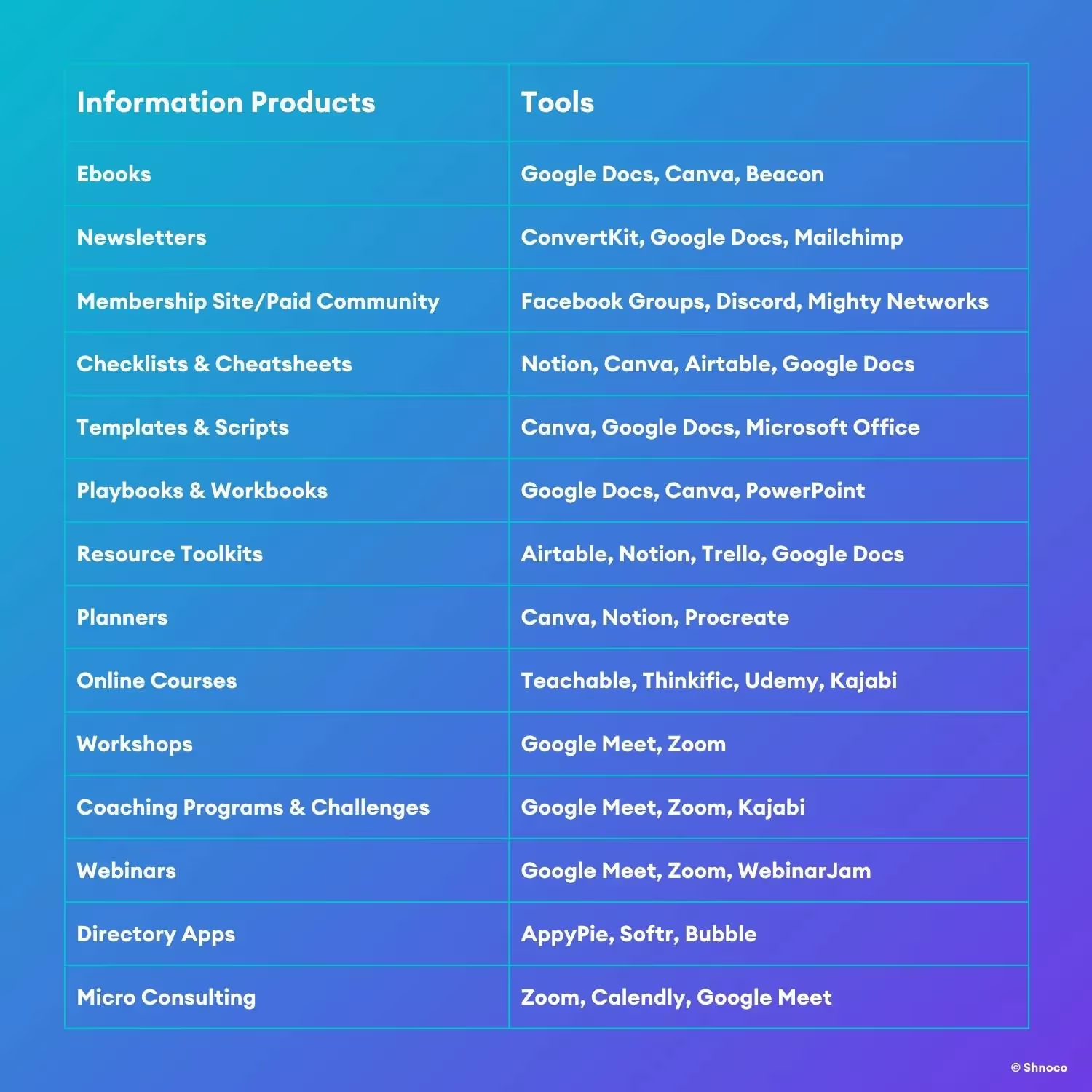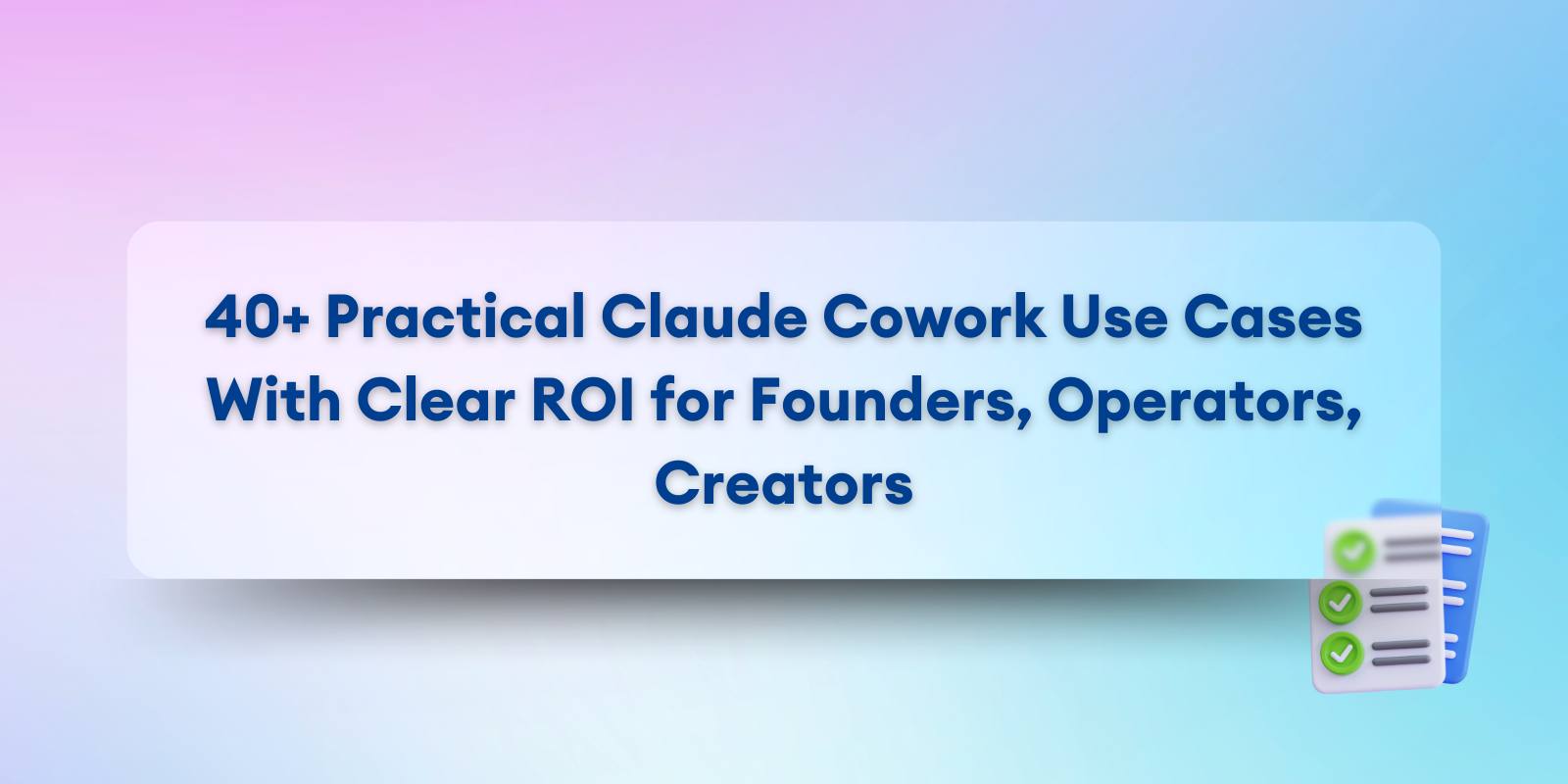
Business is changing, and people have more options than ever to make money online.
With the rise of information products, also known as digital products or info products, you can turn your knowledge and expertise into a profitable business venture.
Whether you're a seasoned entrepreneur looking to add some spice to your product lineup, or a newbie just dipping your toes into the digital waters, an information product is the first thing you should start building right now.
Here are the 13 types of information products you should create to turn your brilliance and knowledge into cold, hard cash:
- Ebooks & Audio Books
- Paid Newsletters
- Paid Communities/Membership Sites
- Checklists & Cheat Sheets
- Templates & Scripts
- Playbooks & Workbooks
- Resource Toolkits
- Planners
- Online Courses & Workshops
- Programs & Challenges
- Webinars & Virtual Summits
- Directory App
- Micro Consulting
But that’s not all. Read on to discover what are information products (or informational products), everything you need to know about each idea, and which info product should you create.
Do not keep your genius-level knowledge to yourself, and make some bucks while sharing your expertise with the world.
What are Information Products?
Information products are products or services that are designed to provide information or knowledge to the consumer and are often sold digitally.
These are marketed and sold online, and can be a lucrative business if you have specialized knowledge in a particular field and can create high-quality, valuable content.
Information products can be delivered in various forms – from ebooks to consulting, we’ll take a look at the top 13 information products in this article.
What is not considered an Information Product?
Anything that does not provide information, knowledge, or expertise to the consumer is not considered an information product.
Non-informational products are meant primarily for entertainment whereas information products are meant to impart knowledge.
Let’s understand with some examples:
- A newsletter of daily short stories is not an info product but a newsletter teaching how to write compelling stories is.
- An e-book showcasing various art pieces isn’t an information product, whereas an e-book for beginners to learn art is one.
- A private group discussing the latest app updates is not an information product but a group meant to share resources to build an app is an info product.
Now that you have a clear idea of what is an information product and what is not, allow us to convince you to consider building one.
Why Should You Consider Building an Information Product?
Building an information product comes with its own set of advantages, and we are here for it. These are one of the easiest businesses you can start, and we’re saying this because of the below reasons:
- Low Cost & High Margin: Compared to physical products or services, information products have a very low cost of production and distribution, which allows for a higher profit margin. This means that you can keep a significant portion of the revenue earned from sales as profit.
- Build Once Sell Twice: Since information products are digital and can be easily replicated, you can sell your products multiple times without incurring additional costs. This creates the potential for passive income streams, which can help generate recurring revenue and opportunity for scaling further.
- Very Short Time-to-Market: Information products can be created and launched quickly, allowing you to get your products to market faster. Most of the info products take around 2 - 8 weeks to build, how fast is that!
- UpSell Opportunities: Info products provide great opportunities to upsell your other info products with the one your customers are buying, like upselling your online course in a webinar. This provides increased revenue for you and value for the customers.
- Build with Zero Employees: Building an information product can be a one-person operation. For most of the info products, you don’t need a second person to help you out, allowing you to operate with minimal overhead costs and increased profit margin.
- Freedom & Independence: Creating information products allow you more flexibility and control over your work life. You’ll be your own boss, and can work whenever you want and from wherever you want, giving you a more fulfilling and satisfying career path.
Now that you have a solid understanding of the essentials and compelling reasons to create an information product, it's time to explore the different types of information products that you can build to generate passive income.
Types of Information Products
Information products offer a versatile and profitable opportunity to share your knowledge and expertise with a wide audience.
Whether you're an expert in your field or simply have a passion for building something worthwhile, there's an information product out there for you to create.
Take a look at this table that includes every possible information product that you’ll ever need in 2024:

1. Online Courses & Workshops

Online courses and workshops are one of the highest revenue-generating info products but these require you to be an expert on the topic.
These are educational products that are delivered through the internet in exchange for payment.
While online courses are lengthy and divided into multiple modules/chapters, a workshop is a one-time class on a topic.
You can create online courses and workshops in many forms, such as pre-recorded video lectures, live video conferences, interactive discussion forums, and assignments that are submitted and graded online. Platforms like Gumroad, Teachable, or Udemy offer easy-to-use tools for creating and selling online courses. Additionally, utilizing learning management systems (LMS) can provide a robust infrastructure for delivering and managing course content.
- Successful Examples: JustinWelsh, 100DaysOfNocode, SQL for Humans, Podcast Like The Pros
- Typical timeframe for creating online courses and workshops: 4 - 14 weeks
- Suitable price range for selling online courses and workshops: $50 to $1,500+
- Revenue potential: $1,000 - $25,000+ per month
- Essential skills required to create online courses and workshops: Content creation, Teaching, Communication
- Tools to consider for creating online courses and workshops: Teachable, Thinkific, Udemy, Kajabi
2. Ebooks & Audio Books

Ebooks are digital versions of books that can be read on electronic devices. They are a great way to make some bucks from your subject matter expertise.
You can divide the ebook into structured chapters and include text, images, or even multimedia elements such as audio or video. For example, an ebook on “How to Create Info Products” or “Strategies to Sell Info Products”.
Whereas, audiobooks are recordings of spoken versions of printed books that can be listened to on electronic devices.
- Successful Examples: MakeBook, The Embedded Entrepreneur, TheMomTest, Writing for Software Developers, Doing Content Right
- Typical timeframe for creating an ebook: 2 - 8 weeks
- Suitable price range for selling an ebook: $20 to $100+
- Revenue potential: $500 - $15,000+ per month
- Essential skills required to create an ebook: Writing, Design, Persuasion
- Tools to consider for creating an ebook: Google Docs, Canva, Beacon
3. Paid Newsletters

Paid newsletters are a type of subscription-based content delivery service where subscribers pay a fee to receive regular information on a specific topic.
Newsletters are typically delivered via email and you can include a variety of content formats, including text, images, and multimedia.
You can also provide some add-on services like, exclusive content, access to private communities, and personalized insights or advice.
For example, if you’re a solopreneur, a newsletter on the lessons from your journey can work well.
- Successful Examples: Stratechery, CategoryPirates, Lenny's Newsletter, Craigmod, Growthlist
- Typical timeframe for creating a newsletter: 2 hrs - 2 days per newsletter
- Suitable price range for selling a newsletter: $10 to $150+ per month
- Revenue potential: $1,000 - $10,000+ per month
- Essential skills required to create a newsletter: Writing, Research, Storytelling
- Tools to consider for creating a newsletter: ConvertKit, Google Docs, Mailchimp
4. Private Groups, Paid Communities, Membership Sites

Private groups, paid communities, and membership sites are online platforms that offer exclusive access to content, resources, and communities to individuals in exchange for a membership fee.
You can create them in various forms such as, Facebook groups, Slack channels, Discord servers, or even standalone websites.
These are great ways to monetize your content and build a community around your brand.
To give you an idea, if you’re a tech creator, a coding resources membership site can be a successful info product.
- Successful Examples: Going, NomadList, SuperPath, FSLearningCommunity, BossBabe
- Typical timeframe for creating a membership site: 1 - 4 hrs
- Suitable price range for selling a membership site: $10 to $100+ per month
- Revenue potential: $1,000 - $25,000+ per month
- Essential skills required to create a membership site: Content creation, Marketing, community management
- Tools to consider for creating a membership site: Facebook Groups, Discord, Mighty Networks
5. Checklists & Cheat Sheets

Checklists and cheat sheets are tools that are designed to help your customers simplify and organize their information and tasks.
Checklists are lists of tasks or items that need to be checked off in a specific order. For example, a checklist for a new freelance business.
Cheat sheets, on the other hand, are squeezed summaries of important information.
You need to craft them as quick reference guides that can help people quickly understand a concept or complete a task. For example, tech jargons cheat sheet.
- Successful Examples: ClarityCalls, The Conversion Checklist, Investing Checklists, Complete Character Design Cheatsheets
- Typical timeframe for creating checklists and cheat sheets: 4 - 11 hrs
- Suitable price range for selling checklists and cheat sheets: $5 to $50+
- Revenue potential: $500 - $5,000 per month
- Essential skills required to create checklists and cheat sheets: Research, Simplifying complex information, Attention to detail
- Tools to consider for creating checklists and cheat sheets: Notion, Canva, Airtable, Google Docs
6. Templates & Scripts

Templates and scripts act as a starting point for your audience to create new business documents and/or messages.
Templates typically include pre-defined formatting, layout, and design elements. Example, templates for crafting converting emails, business plans, or PowerPoint presentations.
Scripts, on the other hand, are pre-written text or dialogue used for communication purposes, like a script to “convert a client on a phone call”.
You can use these as an add-on to your ebooks or courses as they have a low potential to generate revenue independently.
- Successful Examples: Resume templates, Notion Pack, Telly, Notion Second Brain, ChatGPT Template Starter Kit
- Typical timeframe for creating templates and scripts: 6 - 24 hrs
- Suitable price range for selling templates and scripts: $5 to $150+
- Revenue potential: $500 - $5,000+ per month
- Essential skills required to create templates and scripts: Organization, Research, Creativity
- Tools to consider for creating templates and scripts: Canva, Google Docs, Microsoft Office
7. Playbooks & Workbooks

Playbooks are comprehensive guides that outline a specific process. You can include detailed instructions, best practices, templates, and tools on a topic to help people perform their tasks effectively and efficiently.
Like, a product development playbook or social media playbook.
On the other hand, workbooks are fill-in types of ebooks on a topic. You can include worksheets, checklists, and step-by-step instructions in your workbook.
They are structured into chapters and exercises and you need to leave spaces for your customers to fill in their answers. Example, financial planning workbook or productivity workbook.
- Successful Examples: The Financial Freedom Playbook 2.0, Design System in 90 Days, OPTIMAL FUEL 2.0, The M.E.A.N. Workbook
- Typical timeframe for creating playbooks and workbooks: 1 - 4 weeks
- Suitable price range for selling playbooks and workbooks: $10 to $100+
- Revenue potential: $500 - $2,500+ per month
- Essential skills required to create playbooks and workbooks: Research, Organization, Design
- Tools to consider for creating playbooks and workbooks: Google Docs, Canva, PowerPoint
8. Resource Toolkits

Resource toolkits are a collection of tools and resources that are designed to help your customers complete a specific task or achieve a particular goal. You can include a variety of resources, such as templates, checklists, guidelines, and tutorials.
For example, a marketing toolkit may include templates for creating social media posts, guidelines for developing a marketing strategy, and tools for measuring the effectiveness of a campaign.
Resource toolkits have a low potential to be sold standalone, so you can pair them with courses or webinars.
- Successful Examples: TheFutur, ProductLaunchOS, Startup Growth KIT, Classic Swipe File, Dashboard UI Kit 3.0
- Typical timeframe for creating resource toolkits: 2 - 7 days
- Suitable price range for selling resource toolkits: $20 to $200+
- Revenue potential: $2,000 - $20,000+ per month
- Essential skills required to create resource toolkits: Research, Collaboration, Organization
- Tools to consider for creating resource toolkits: Airtable, Notion, Trello, Google Docs
9. Planners

Digital planners are one of the easiest info products that you can create. They are designed to help individuals organize their time and tasks.
You can include sections such as calendars, to-do lists, and goal-setting pages in your planners.
For example, you can create a meal planner, weekly planner, budget planner, or wedding planner and the ideas are endless.
You can create multiple planners that are closely related and sell them as a bundle.
- Successful Examples: Plan a Trip, Social Media Planner, Get Your Money Right, Pregnancy Planner, Ultimate Wedding Planner
- Typical timeframe for creating planners: 1 - 4 days
- Suitable price range for selling planners: $10 to $150+
- Revenue potential: $500 - $2,500+ per month
- Essential skills required to create planners: Design, Creativity, Research
- Tools to consider for creating planners: Canva, Notion, Procreate
10. Programs & Challenges

Programs are more comprehensive than courses or workshops, helping your customers develop a deeper understanding of the topic. You can design programs for a specific audience or goal, such as a business coaching program or a language learning program.
Whereas, challenges are shorter and more focused than programs. They are designed to help individuals achieve a goal or develop a skill in a short period of time. For example, a 30-day fitness challenge.
To make these info products more attractive, you can include group coaching sessions, peer support, and progress tracking.
- Successful Examples: NotionMastery, B-School, Javascript30, Ship 30 for 30
- Typical timeframe for creating programs and challenges: 2 - 10 weeks
- Suitable price range for selling programs and challenges: $100 to $5,000+
- Revenue potential: $1,000 - $25,000+ per month
- Essential skills required to create programs and challenges: Coaching, Assessment, Training and Development
- Tools to consider for creating programs and challenges: Google Meet, Zoom, Kajabi
11. Webinars & Virtual Summits

Webinars and virtual summits are online events that allow individuals to participate in educational or professional development experiences.
Webinars are live or pre-recorded presentations that last for 1-2 hours. You can deliver them through a video conferencing platform on the topic of your expertise such as marketing strategies, leadership development, etc.
Virtual summits, on the other hand, are multi-day events that bring together a group of experts to share insights and strategies on a specific topic.
You can use these as a way to attract your audience to larger info products like online courses or memberships.
- Successful Examples: UX+ CONFERENCE, Product Led Growth Summit
- Typical timeframe for creating webinars and virtual summits: 2 - 6 days
- Suitable price range for selling webinars and virtual summits: $50 to $200+
- Revenue potential: $500 - $5,000+
- Essential skills required to create webinars and virtual summits: Content creation, Presentation, Communication
- Tools to consider for creating webinars and virtual summits: Google Meet, Zoom, WebinarJam
12. Directory Apps

Directory apps are applications that provide a searchable database of businesses, organizations, or services, within a particular geographic area or industry.
You need to build them specific to a particular industry or sector, such as a restaurant directory or a doctor directory and include detailed information about each listing, including contact information, reviews and ratings, hours of operation, and other relevant details.
- Successful Examples: Integrations Directory, Product Explorer, NoCodeList, SaaS Blocks, Hive Index
- Typical timeframe for creating directory apps: 4 - 10 weeks
- Suitable price range for selling directory apps: $10 to $100+ per month
- Revenue potential: $1,000 - $10,000+ per month
- Essential skills required to create directory apps: Software development, Research, Data management
- Tools to consider for creating directory apps: AppyPie, Softr, Bubble
13. Micro Consulting

Micro consulting is a type of consulting service that provides short-term, focused advice and guidance on a specific topic or problem.
You need to have expertise in a specific area or industry, and offer your services on a project or hourly basis.
You may consider providing micro consulting on multiple topics, like LinkedIn, lead generation, content creation, and soo much more.
You can use consulting as a supplement form of revenue with workshops, ebooks, or newsletters.
- Successful Examples: Channel as a Service, Delverise, Kevin C. Whelan Advisory, Neu21, Cruns
- Typical timeframe for creating micro consulting: Ongoing
- Suitable price range for selling micro consulting: $50 to $1,000+ per hour
- Revenue potential: $5,000 - $25,000+ per month
- Essential skills required to create micro consulting: Communication, Active listening, Coaching
- Tools to consider for creating micro consulting: Zoom, Calendly, Google Meet
Now that you have so many ideas for information products, you might think “But which info product should be best for me to build?”
We have some criteria upon which you can decide the best-suited information product for you.
How to Decide Which Information Products to Create?
When deciding which information products to create, there are several criteria that can be considered to ensure the product will be successful and profitable.
Before rushing into creating one, take time to analyze each of these criteria and shortlist the information product best suited for you.
- Your Expertise: Consider your areas of expertise and knowledge. What topics and fields do you have the most experience in and can provide the most value to your audience? For example, creating a template or planner doesn’t require you to be an expert on the topic but creating an online course does.
- Audience Demand: Look at what your audience is searching for and what topics they are interested in. Conduct research and surveys to determine what type of information products your audience would be most interested in. If you’ve already built a brand and an audience base around a subject, it’ll be easy for you to sell your info products.
- Time and Resources: Consider the time and resources you have available to create an information product. Like, if you have limited time or want to quickly test your hand at information products, consider creating a product that can be created in less time, such as an e-book or a webinar.
- Profit Potential: Determine the potential profitability of your chosen information product. Consider the price point, the size of your audience, and the potential revenue streams, such as upsells and affiliate marketing. A webinar or workshop has good profit potential and the opportunity to upsell other products like courses, resulting in overall higher revenue.
- Building Frequency: Determine the time and efforts you are willing to devote to your information product. Ask yourself if you want to create the product just once and be done (like e-books and courses) or if are you willing to put in consistent efforts (like consulting or newsletters).
Before You Go
With the power of information products, you can turn your expertise and passion into a profitable business to thrive in the online era with no limit to the revenue you can generate.
Whether you're a seasoned entrepreneur, or just someone with a unique perspective to share, there is no better time to jump into the river of info products and share your knowledge with the world.
In today's digital age, there are plenty of tools and resources available to make the info product creation process easier than ever before.
There are variety of platforms available to sell your info products and make the process easy and efficient so that you can concentrate your entire focus on creating the best in class information product and deliver top notch value.
So, you literally don’t have any excuse left to ditch the thought of creating an info product.
Remember, the key to a successful info product is to deliver real value to your audience. So, focus on providing helpful information and solving your customers' problems.
Now, get your thinking caps on, tap into your inner guru, and let's make some money!
Now, time to answer some of your most common questions on information products:
What is an info product?
Info products are products or services that provide information or knowledge to the consumer.
The goal of an info product is to provide valuable and educational content to the target audience, while also generating income for yourself.
What are digital information products?
Digital information products are info products that are delivered in a digital format or can be accessed via electronic devices, such as e-books, online courses, videos, and much more.
They can be downloaded or streamed from various online platforms, such as websites, online marketplaces, and social media platforms.
What is the use of information products?
Information products can be used for several purposes such as:
- Education
- Revenue generation
- Branding
- Marketing
- Personal growth
How do you create information products?
Creating an information product requires a series of steps that you need to follow:
- Choose a Topic: Select a topic that you have expertise in or that you are passionate about.
- Research: Conduct research to gather information and insights on the topic, to make your info product comprehensive.
- Plan Content: Create an outline or plan for your content, breaking it down into sections or parts that are easy to understand and follow.
- Create Content: Once you’ve planned everything, develop your content using various formats and tools.
- Launch and Promote: Launch your information product on a platform or website, and promote it through various marketing channels.
What is the concept of Infopreneurship?
Infopreneurship refers to the creation and monetization of information-based products and services.
It involves using your knowledge and expertise to create information products such as e-books, courses, webinars, and coaching programs, which can be sold to a targeted audience.
What is an example of an Infopreneur?
Infopreneurs are individuals who leverage their skills, knowledge, and expertise to build a business around the creation and sale of information products.
There are several well-known infopreneurs like, Tony Robbins who has built a successful business around his expertise in personal development, leadership, and motivation and offers a range of information products, including books, audio programs, seminars, coaching programs, and online courses.
Other examples include Marie Forleo, Tim Ferriss, and Gary Vaynerchuk.
What are the benefits of being an Infopreneur?
Being an infopreneur comes with a wide range of benefits that you can enjoy, including:
- Flexibility and Freedom: As an infopreneur, you’ll have the freedom to work from anywhere, set your own schedule, and work on your own terms.
- Unlimited Income Potential: You can earn unlimited income from your information products, as there are no limits on the number of people you can reach, the amount you can charge for your products, or the number of info products you can create.
- High-Profit Margins: You can have high-profit margins on your info products, as the costs of creating and distributing digital products are low compared to physical products. This means that you get to keep more of the revenue you generate.


.jpg)

